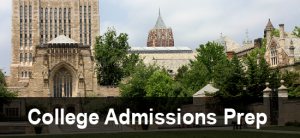College visits are a great way for you to get a good feel for schools, demonstrate your interest, and even increase your chances of gaining admission to them. . .but only if you make the most of them.
COLLEGES VISITS AND DEMONSTRATED INTEREST
Some colleges keep track of your visits and contacts with them. Even if they don’t officially record your interactions, you could be asked to share them in your application.
TIP: Sign in when you attend the information sessions and campus tours that are a standard part of college visits. Don’t try to fly under the radar or have your parents write their names. Put down your name. Make your visit count.
Brian C. Rosenberg, president of Macalester College, explains that “a campus visit is the most important sign that an applicant is seriously interested, and there are times when that expression of interest can make the difference between acceptance and rejection. All colleges prefer to admit students who are likely to accept their offers of admission.”
Paul Thiboutot, vice president and dean of admissions at Carleton College, says that they use demonstrated information in “an anecdotal sense when trying to decipher between applicants who otherwise appear to be very similar.” If they’re considering “two or three students whose qualifications look very similar,” the admissions team “may give. . .an edge” to the “one came for an overnight and addressed the `why Carleton?’ question well on their application.”
Rice even says on their admissions page that “there is no better way to demonstrate your interest in Rice than a visit to campus.”
That’s right.
You’re not the only one focused on getting accepted.
Some colleges–even very good ones–are concerned about whether their accepted students will accept them.
Why?
According to the National Association for College Admissions Counseling (NACAC), “colleges need to know whether you are serious about attending if accepted, because if a college is under- or over-enrolled, there are serious consequences for the college.” Due to the “large number of applications flooding in, colleges are trying harder to figure out how interested applicants are.”
NACAC’s 2017 Admissions Trends Survey reveals that 13.7% of colleges indicated that a student’s demonstrate interest is of “considerable importance,” 25.5% of said it’s of “moderate importance,” 32.1% claimed it’s of “limited importance,” and 28.8% say it’s of “no importance” in terms of admission.
Schools also want to know that you truly understand why their institution is a great fit for you. Obviously, you can demonstrate fit in other ways (e.g., by conducting in-depth online research), but campus visits are really helpful.
WHAT IF YOUR COLLEGES SAY THEY DON’T “COUNT” VISITS OR OTHER DEMONSTRATED INTEREST?
Plenty of schools do not officially factor demonstrated interest into their decision-making process.
When asked if Brown shows “a preference in the admission process for students who have demonstrated interest by visiting, calling and emailing,” the admissions team is very straightforward:
“Not at all. Contacting the Admission Office is neither a requirement nor an advantage in our admission process. We offer campus tours and information sessions to provide you with the information you need to make an informed college choice, not evaluate you. And we welcome calls and emails for the same reason. Please do not feel compelled to contact us to demonstrate your interest in Brown; we know by the very fact of you applying that you are seriously interested in Brown. The number of times you call or email us will not have an impact on your admission decision.“
The University of Virginia is very explicit that they do “not use demonstrated interest at all.” It’s “not a factor used” in their “admission process.”
Yale also is upfront about the fact that they do “not track `demonstrated interest’ in any form for the purpose of evaluating applications. Visiting campus or attending an information session can be an excellent way to learn more about Yale, but it will not affect your chances of admission.”
If your schools don’t keep track of demonstrated interest or use in the admissions process, there are still great benefits to visiting campuses if doing so is affordable and possible for you.
TIP: Can’t afford to visit schools? Check out fly-in programs, which are “two- to three-day college tours for prospective or admitted students from underrepresented backgrounds,” especially for students whose family has a low income. Click here to learn more about them and which schools offer them.
Don’t underestimate the power of getting a feel for the vibe of the school. A school can sound amazing on paper, but you can get there and realize it isn’t the place for you.
Of course, you might also want to wait to see if you are accepted and then go to the special admitted student programs.
You can also often find a way to integrate a meaningful reference to your visit in one of your supplements for schools.
THINGS YOU SHOULD DO BEFORE & DURING YOUR COLLEGE VISITS
Visiting colleges requires an investment of time and money. To get a good return on this investment and make your visit as meaningful as possible, you need to prepare for your adventure.
TIP: Try to schedule your visit when college is in session. Visiting campus when students are around will give you a better sense of the general vibe of the school and increases your chances of participating in special opportunities to sit in on classes and connect with undergraduates. It’s not the end of the world if you visit during the summer or when the school is on some other kind of break, but the school does feel different. Make sure that you officially register online for your visit. Sometimes the information sessions and tours do get filled up. Just wandering around campus on your own isn’t the most useful thing.
TIP: Maximize what you do during your visit. Most students think that all you do is sit in on an admissions information session and go on a tour, but if you plan ahead, you might be able to experience some more individualized opportunities like sitting in on a class.
Admissions info sessions and campus tours can be great, but there is often surprisingly little discussion about the academic life of students at the school. The best information session I’ve attended was at Colgate, where three students were on a panel and talked about how specific professors and classes transformed the nature of their work and their goals. It was great.
Many schools require you to write supplemental essays about why you feel their college will provide you with the ideal environment for pursuing your intellectual interests. Sitting in on a class will actually give you a taste of what the intellectual dynamic is like at the school, and you can often integrate this experience into your supplement.
TIP: Check out each college’s Admissions page and see if they mention anything about visiting classes. Many colleges don’t have classes on Fridays, so take that into consideration when planning.
Some colleges will give you very general information about sitting in on classes while others might have more specific details. It’s also possible that they’ll say nothing about class visits.
For instance, Middlebury College tells you:
“Prospective students are welcome to visit classes. Please consult the course schedule. . . .Classes at the 100 or 200 level are most appropriate. Please arrive a few minutes before class, or email the professor in advance to ask permission, as there may be an exam planned or other reason why it would be best not to have visitors that day.”
Tulane University provides you with a 17-page document that features a “list of pre-approved courses listed by department” and is updated each semester. These are “selected classes for which professors have granted semester-long permission for prospective students to visit.”
If the college permits visits and you find a class you want to sit in on, I advise you to reach out to professors ahead of time to see if it’s okay to visit on the day you’re visiting (in case there’s a test that day or some other reason the professor might not want a visitor). Mention the name of the course and when (day and time) you’d like to visit. Feel free to share a few details about yourself and why you’re interested in attending their particular course. You might even want to ask if there’s anything you can do to prepare for your visit. Many professors post their syllabi online, so make sure you visit the departmental website and look them up. Make sure you address them properly. Most of your college professors have earned a Ph.D., so, unless they tell you otherwise, you should refer to them as Professor [Last Name] or Dr. [Last Name].
TIP: See if there are any other specialized opportunities and make sure you register (if necessary) for ones that interest you.
The University of Pennsylvania offers “Chat and Chew Lunch Visits” that allow you to eat lunch with a Penn student, who “will share their experiences with Penn’s world-class academics, diverse student body, and plethora of student activities over a meal in one of [their] great-tasting, dietary-flexible, and environmentally sustainable dining halls.”
Carnegie Mellon offers “Turn Tartan Overnights” (Sunday morning through Monday afternoon), which let you “experience life as a Tartan both on-campus and in the city of Pittsburgh” and give you the chance to “meet current students, faculty members, deans and admissions staff”; “attend College and Department Information Sessions”; “attend classes”; “tour campus”; and “eat in the dining facilities.”
TIP: Take a look at the most recent supplemental application essay topics for the colleges you’re going to visit. These topics can give you a sense of some things you might want to be on the lookout for when you visit.
CLICK HERE to read my article on supplemental application essays.
TIP: You should have a notebook and jot down specific impressions.
I actually encourage students and parents to have their own notebooks and make their own observations. These observations can make for interesting conversations on the way home.
You should write down important things people say, names (of the person leading the admissions session, the students, etc.), interesting things you see, and the “vibe” of the school and your feelings about it.
I know that on some level this advice is so totally obvious, but so many people don’t wind up taking the time to jot things down and then, when the crush of information from a bunch of schools hit you, they forget these details, which can be useful when, for instance, you have an interview or need to describe things in a supplement.
HAVE FUN!
You’re launching the next phase of your life, so let yourself have a good time and imagine the exciting possibilities at each school.
WAYS TO WORK WITH DR. BERNSTEIN!
Click here to learn how to schedule a private consultation with Dr. Bernstein.
Click here to learn more about Dr. Bernstein’s ongoing private college preparation and college admissions support.
Click here to learn about the online Get Yourself Into College® program.
Blog post images in order of use: ©SamK2/bigstock.com, ©bymandesigns/bigstock.com, ©carmendorin/bigstock.com



